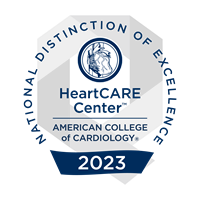Our heart team knows that no two patients are the same. We work to understand your specific condition and medical history, guiding you through a treatment plan tailored to your needs.
While many heart conditions can be regulated with medication and lifestyle changes, others may require you to see an interventional cardiologist or electrophysiologist who will determine whether an implant or intervention can improve your condition. If our experts decide surgery is the best course of action, our highly trained heart and vascular surgeons will provide you with excellent care that improves your quality of life. Find a medical expert now.
Leaders in Research and Innovation

Bayhealth remains at the forefront of medical advancements, with a focus on delivering innovative care. We were the first health system in Delaware to receive certification for the Transcatheter Aortic Valve Replacement (TAVR) procedure. Likewise, our cardiac catheterization laboratories (also known as cath labs) feature the latest technologies for minimally invasive treatments. Find our cath labs and other locations.
We have also been recognized by the American College of Cardiology (ACC) as a HeartCARE Center of Excellence, a distinction that denotes top-tier work and dedication to our patients. This prestigious designation represents excellence in several of our programs, including our TAVR program, cath and electrophysiology (EP) labs, and cardiothoracic surgery programs. Learn more about our awards and accreditations.
Procedures and Surgery We Offer
Our heart and vascular experts provide the most advanced treatment options. From traditional open-heart surgeries to breakthrough procedures that use minimally invasive techniques, our experienced medical teams tailor their approach to your condition and needs.
Among the many surgeries and procedures we offer are the following:
- Carotid endarterectomy: Surgeons make an incision in the neck and remove plaque from the carotid artery to restore a healthy blood flow and eliminate stroke risk.
- Coronary artery bypass grafting (CABG) surgery: Surgeons create grafts to redirect the flow of blood and bypass the blocked areas. This procedure can be performed in the traditional manner (open heart surgery) or using minimally invasive techniques.
- Intuity valve replacement: Unlike other replacement valves, which can require as many as 15 sutures, the Intuity valve only requires three reinforced sutures to guide and secure implantation inside the heart. Learn more about Intuity valve replacement.
- Lower extremity surgical bypass: When enough plaque builds up inside an artery (atherosclerosis) of the legs, it may become necessary for a surgeon to create an alternate route for your blood to flow, bypassing the blocked area.
- Maze procedure: A surgeon makes a series of incisions throughout the upper chambers of your heart, altering the electrical signals that contribute to arrhythmia.
- Revascularization: A procedure that addresses peripheral vascular disease (PVD), restoring blood flow to a blocked vein or artery.
- Surgical valve replacement: During this open-heart procedure, the faulty valve is removed and replaced with a tissue or mechanical valve.
Our interventional or minimally invasive procedures include the following:
- Angioplasty: During this minimally invasive procedure, doctors eliminate blockages by using a narrow tube (catheter) to inflate a balloon inside your artery. The balloon displaces the cholesterol and returns blood flow to normal.
- Catheter ablation: A narrow tube (catheter) is guided to your heart, where it either uses radiofrequency energy or a refrigerant-filled balloon to disable unwanted electrical signals contributing to arrhythmia. Learn more about catheter ablation.
- Electrophysiology study: Narrow tubes (catheters) are inserted into your heart through your veins in order to measure and record electrical signals and abnormal rhythms.
- Endovascular aneurysm repair (EVAR): This minimally invasive procedure reinforces the aorta (blood vessel) when an aneurysm occurs, meaning the wall of the aorta has become weak or shows signs of ballooning.
- Implantable cardioverter-defibrillator (ICD): A small device is implanted in your chest, where it detects arrhythmias and delivers electrical shocks that restore your heart to a normal rhythm.
- Pacemaker: This device, implanted in your chest during surgery, is designed to deliver electrical impulses whenever your heartbeat slows to an unacceptable level.
- Stenting: Typically used after an angioplasty, a stent (which resembles a mesh tube) is inserted into the narrowed artery to support or hold it open.
- Transcarotid artery revascularization (TCAR): During this less-invasive alternative to an endarterectomy, a surgeon makes a small incision in the neck and installs a device to reverse blood flow. A stent is then placed in the artery, allowing the device to capture plaque. Learn more about TCAR.
- Transcatheter aortic valve replacement (TAVR): A narrow tube (catheter) is inserted into the femoral artery through your groin or leg, guiding a replacement valve into your heart. Once in place, the new valve expands to fill the space and pushes the faulty valve aside. Learn more about the TAVR procedure at Bayhealth.
- Left atrial appendage occlusion (LAAO): A small device is implanted in the left atrial appendage (LAA) of the heart, which limits the need for blood thinners among patients with atrial fibrillation (A-Fib). Learn more about the LAAO.
If you already have an upcoming procedure scheduled, learn more about how to prepare for it.
Emergency Cardiac Procedures
Our team knows that every second counts during a heart attack or other emergency. That’s why patients who arrive at Bayhealth seeking urgent care are met by a team of first-rate medical professionals and heart surgeons. Our heart and vascular experts exceed nationwide standards in heart attack care, ensuring that you have the greatest chance for the best outcome. Find address and contact information for our emergency and trauma centers.
